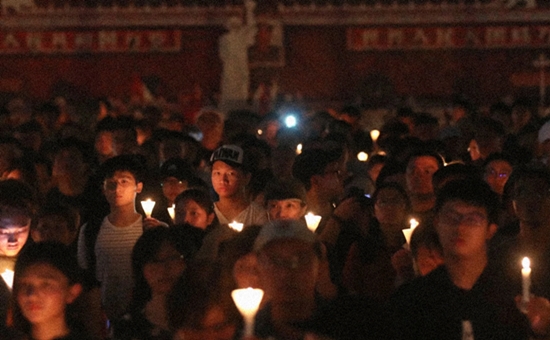
The Chinese government outlaws public commemorations of the Tiananmen Square incident, the “series of protests and demonstrations in China in the spring of 1989 that culminated on the night of June 3–4 with a government crackdown on the demonstrators in Tiananmen Square in Beijing.”
According to Britannica’s summary:
[On April 22] tens of thousands of students gathered in Tiananmen Square demanding democratic and other reforms. For the next several weeks, students in crowds of varying sizes—eventually joined by a wide variety of individuals seeking political, social, and economic reforms—gathered in the square. The initial government response was to issue stern warnings but take no action against the mounting crowds in the square….
During the last two weeks of May, martial law was declared in Beijing, and army troops were stationed around the city. However, an attempt by the troops to reach Tiananmen Square was thwarted when Beijing citizens flooded the streets and blocked their way….
By the beginning of June, the government was ready to act again. On the night of June 3–4, tanks and heavily armed troops advanced toward Tiananmen Square, opening fire on or crushing those who again tried to block their way. Once the soldiers reached the square, a number of the few thousand remaining demonstrators there chose to leave rather than face a continuation of the confrontation. By morning the area had been cleared of protesters, though sporadic shootings occurred throughout the day. The military also forcibly moved in against protesters in several other Chinese cities, including Chengdu, but in Shanghai the mayor, Zhu Rongji (later to become the premier of China), was able to negotiate a peaceful settlement. By June 5 the military had secured complete control, though during the day there was a notable, widely reported incident involving a lone protester—who was subsequently dubbed “Tank Man”—facing down a column of tanks as it advanced on him near the square.
For many years, annual public commemorations of Tiananmen Square were still possible in Hong Kong (as shown in the above photo taken in 2019) if not on the mainland. But this changed after China imposed the 2020 National Security Law on Hong Kong, a law affirmed by a “local” version enacted by obedient Hong Kong officials in 2024. In recent years, Hongkongers have been arrested for participating in candlelight vigils to commemorate Tiananmen Square.
However, reports South China Morning Post, “Hongkongers can mark Tiananmen Square crackdown in private without breaching Article 23 national security law, government advisers say.”
Hongkongers can light candles within their homes and can think about Tiananmen Square and other things in the privacy of their own minds without being arrested. Is the response supposed to be “Thanks”?
Meanwhile, “Hong Kong’s top Catholic priest urges ‘forgiveness’ for harm caused in Tiananmen Square crackdown ahead of anniversary.”
Hong Kong’s top Catholic priest has called on residents to “proactively forgive” those who inflicted wounds during the 1989 Tiananmen Square crackdown and move on from “the dark space of unending sadness and resentments” caused by the event for the sake of “reconciliation and healing”.
Cardinal Stephen Chow Sau-yan, in an article published on Friday in Catholic newspaper the Sunday Examiner, also reminded readers that “to forgive is not to forget”, though he did not explicitly mention the June 4 incident….
He urged different parties to “move beyond finger-pointing and the painful ‘I will never forgive’ mindset,” stressing that it was through forgiveness that reconciliation and healing stood “a better chance of becoming a reality”.
The assertions are presumptuous about what those who commemorate Tiananmen Square and other actions of the Chinese government “need.” “Forgiveness” on what basis? Reconciling with what? To what end? No longer opposing oppression and murder? No longer wanting freedom? Giving up?
Are Hongkongers supposed to be eager to “reconcile with” a totalitarian state that is still treating human life and rights with the same contempt that it showed in Tiananmen Square in 1989, a state that has crushed the freedom they once enjoyed? A state that will arrest them, today, if they light a candle in the street?





